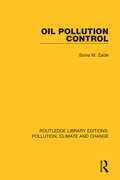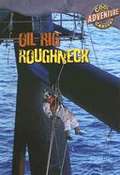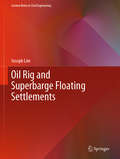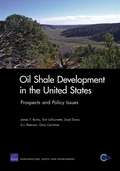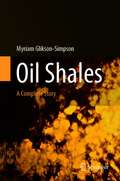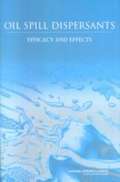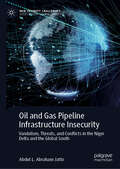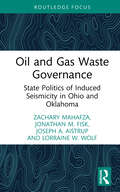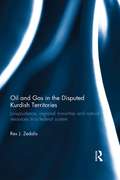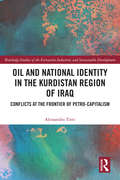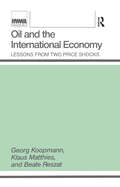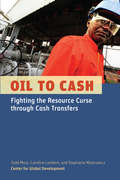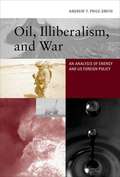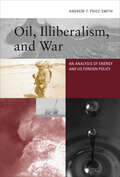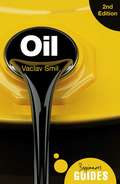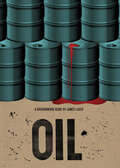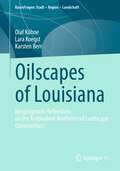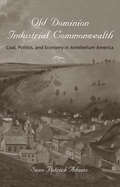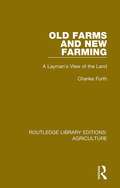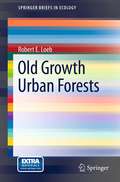- Table View
- List View
Oil Pollution Control
by Sonia M. ZaideOil pollution has been a major environmental concern since the 1920s. The search for a solution has ranged from prevention to partial measures coupled with compensation and remedial action. This book, originally published in 1987, offers a different assessment of the efforts of governments and the oil and maritime industries. It was also the first book to provide a comprehensive story of control policies and practices, using primary and secondary sources. The book identified numerous factor – personalities, state policies, developments in the oil and shipping industries, public agitation and scientific studies in a framework useful for analysing any environmental problem.
Oil Rig Roughneck (Cool Adventure Careers)
by Geoffrey M. HornThe first group of titles in an ongoing series introduces students to six amazing adventure careers. Geared for reluctant readers in upper elementary school and above, each high-interest title combines easy-to-follow text with engaging on-the-job photos to spark students' interest in reading and career exploration. Each book is filled with descriptive information about the career, along with the skills and requirements needed to pursue a job in the profiled field.
Oil Rig and Superbarge Floating Settlements (Lecture Notes in Civil Engineering #82)
by Joseph LimThis book presents a collection of proposed offshore and nearshore settlements in response to the emerging consequences of climate change. These settlements are counterpoints to megacities with unsustainable ecological footprints. The continuing depletion of natural resources has resulted in displaced communities, prompting the following research questions: What if we floated on sea instead of inefficiently consuming land? Could we use wave energy instead of nuclear energy? How can we replenish food supply and regenerate marine eco-diversity? How would our lives be shaped by new offshore settlements? What would we use as structures for shelter, farming, scaffolding and recreation? Floating cities emerged in the 1960s with Buckminster Fuller’s Triton City and Kenzo Tange’s Tokyo Bay Plan, and current manifestations include Vincent Callebaut’s Lilypad, the Seasteading Institute and the mile-long Freedom Ship housing 50,000 people. As an alternative to these examples, the book proposes the repurposing of three types of marine vessel: jack-up platforms, semi-submersibles and superbarges as sustainable, habitable structures to accommodate 20% of the projected 8.1 billion global population in 2025. The spatially conceived floating settlements include food and energy supplies for housing, recreation, education at sea, post-disaster health care and resettlement for nearshore deployment.
Oil Shale Development in the United States
by Tom Latourrette James T. Bartis D. J. Peterson Gary Cecchine Lloyd DixonIn the early 1980s, industry and government took a hard look at the economics of extracting oil from vast deposits of shale that lie beneath the western United States. Oil prices subsided, and interest waned. With oil prices spiking and global demand showing no signs of abating, reexamining the economics of oil shale makes sense. In this report, the authors describe oil shale resources; suitability, cost, and performance of new technologies; and key policy issues that need to be addressed by government decisionmakers in the near future.
Oil Shales: A Complete Story
by Miryam Glikson-SimpsonThis book provides thorough knowledge and detailed information of oil shales using a range of conventional and unconventional techniques and methodologies combined to elucidate the composition of oil shale deposits. As these rocks are mined for energy production their composition and mineral constituents are of special interests to individuals and communities that are likely to be effected by these resources when mined and processed. The book highlights the environmental and health hazards of the spent shales after processing. These are significantly greater in volume than the rocks originally mined before processing. Toxic metals tend to double and triple their concentrations in the spent shales and will be leached into water sources and soils.Since oil shales as an energy resource are totally uneconomical; all oil shales, their mining and processing are heavily subsidised by governments and institutions using taxpayers money.
Oil Spill Dispersants: Efficacy and Effects
by National Research Council of the National AcademiesApproximately 3 million gallons of oil or refined petroleum products are spilled into U.S. waters every year. Oil dispersants (chemical agents such as surfactants, solvents, and other compounds) are used to reduce the effect of oil spills by changing the chemical and physical properties of the oil. By enhancing the amount of oil that physically mixes into the water, dispersants can reduce the potential that a surface slick will contaminate shoreline habitats. Although called for in the Oil Pollution Act of 1990 as a tool for minimizing the impact of oil spills, the use of chemical dispersants has long been controversial. This book reviews the adequacy of existing information and ongoing research regarding the effectiveness of dispersants as an oil spill response technique, as well as the effect of dispersed oil on marine and coastal ecosystems. Oil Spill Dispersants also includes recommended steps for policy makers faced with making hard choices regarding the use of dispersants as part of spill contingency planning efforts or during actual spills.
Oil and Gas Pipeline Infrastructure Insecurity: Vandalism, Threats, and Conflicts in the Niger Delta and the Global South (New Security Challenges)
by Abdul L. JattoThis book offers a comprehensive analysis of infrastructure insecurity issues in the historic Niger Delta, drawing on empirical fieldwork involving host communities, regulators, and multinational oil and gas operators. It introduces innovative models and theories, such as a pipeline life cycle model focusing on community development, community neglect aggression displacement theory, social aggression theory, stakeholders’ policy development model, contemporary poor governance cycle model, and an infrastructure insecurity nexus model, linking governance, socio-economic conditions, and infrastructure insecurity in resource-rich regions of the Global South. The book bridges gaps left by previous publications, providing depth and applicability of data. It employs the Frustration- Aggression Displacement theory to explain underlying triggers of violence and uses real-world case studies, diagrams, and charts to facilitate understanding. Suitable and engaging for individuals, communities, or regulators involved in oil and gas activities alike, this book offers valuable insights into onshore pipeline infrastructure insecurity in Nigeria, West Africa, and the broader Global South, addressing regulation, compliance, environmental concerns, social aspects, and technological innovations.
Oil and Gas Waste Governance: State Politics of Induced Seismicity in Ohio and Oklahoma (Routledge Research in Public Administration and Public Policy)
by Jonathan Fisk Zachary Mahafza Joseph A. Aistrup Lorraine W. WolfIn Oil and Gas Waste Governance, Zachary Mahafza, Joseph A. Aistrup, Jonathan M. Fisk, and Lorraine W. Wolf tell the story of unconventional oil and gas production, earthquakes, and how they both relate to the much broader conversation centering on private property, energy production, and the role of science within the public policy process, and environmental sustainability.Utilizing a unique national-level dataset that includes human-induced earthquakes associated with oil and gas development between 2006 and 2018, the book combines insights on focusing/tipping events, media, geoscience, and state-choice to develop and test a new model of event-driven policy change. Examining the politics of induced seismicity at the national level as well as in Ohio and Oklahoma, the authors demonstrate how event severity and frequency interact with political and social considerations and, in turn, contribute to administrative decision-making. Oil and Gas Waste Governance offers a much-needed examination of seismicity in Public Administration and Public Policy.
Oil and Gas in the Disputed Kurdish Territories: Jurisprudence, Regional Minorities and Natural Resources in a Federal System
by Rex J. ZedalisThis book examines the historical and contextual background to the oil and gas resources in the Kurdish territories, placing particular emphasis on the reserves situated in the disputed provinces. The volume is singularly unique in focusing on an examination of the rules reflected in both the national and the regional constitutional, legislative, and contractual measures and documents relevant to the question of whether the central government in Baghdad or the Kurdish Regional Government (KRG) in Erbil has a stronger claim to legal control over the oil and gas resources in the disputed Kurdish territories. As a subsidiary focus, the author also draws attention to how the basic thrust of the volume connects to broader jurisprudential issues regarding the nature and purpose of law, the matter of claims by native peoples to natural resources on traditional lands, and the place of regional minorities operating in a federal system. Since the law examined is domestic or municipal in origin, additional reference is made to the role that such law can play in the "bottom up" (as opposed to more conventional "top down") development of international law. The book’s opening chapters provide a valuable contextual introduction, followed by a number of substantive chapters providing an analytical and critical assessment of the controlling legal rules. Written in a scholarly, yet accessible style, and covering matters of basic importance to academics, lawyers, political scientists, government representatives, and students of energy and natural resources, as well as those of developing legal structures, Oil and Gas in the Disputed Kurdish Territories is an essential addition to any collection.
Oil and National Identity in the Kurdistan Region of Iraq: Conflicts at the Frontier of Petro-Capitalism (Routledge Studies of the Extractive Industries and Sustainable Development)
by Alessandro TintiExamining the interplay between the oil economy and identity politics using the Kurdistan Region of Iraq as a case study, this book tells the untold story of how extractivism in the Kurdish autonomous region is interwoven in a mosaic of territorial disputes, simmering ethnic tensions, dynastic rule, party allegiances, crony patronage, and divergent visions about nature. Since the ousting of Saddam Hussein, the de-facto borders of the Kurdistan Region of Iraq have repeatedly changed, with energy interests playing a major role in such processes of territorialisation. However, relatively little research exists on the topic. This book provides a timely, empirical analysis of the intersections between extractive industries, oil imaginaries, and identity formation in one of the most coveted energy frontiers worldwide. It shines a light on relations between the global production networks of petro-capitalism and extractive localities. Besides the strained federal relationship with the Iraqi central government, the transformative effects the petroleum industry has had on Kurdish society are also explored in depth. Moreover, the book fills a gap in the literature on Kurdish Studies, which has devoted scant attention to energy-related issues in the re-imagination of Kurdish self-determination. This book will be of great interest to students and scholars of the extractive industries, energy studies, conflict studies, Middle Eastern politics, and political ecology.
Oil and the International Economy
by Beate Reszat Georg Koopmann Klaus MatthiesThe oil price increases of the 1970s left deep marks on the world economy. They led to a massive redistribution of income in favor of oil-producing countries, and caused serious disruption of growth, imbalances in foreign trade, and problems of stability in oil-importing countries. Despite the present levelling off, the authors suggest that more price increases remain a distinct possibility.Oil and the International Economy examines the effects of rising oil prices on the international financial system and identifies ways that oil-importing countries can overcome the financial and adjustment problems caused by them. The authors project the long-term trend in real oil prices and present economic policy options to help avoid future financial problems for industrialized and developing nations alike.
Oil in the Environment
by John A. WiensWhat light does nearly 25 years of scientific study of the Exxon Valdez oil spill shed on the fate and effects of a spill? How can the results help in assessing future spills? How can ecological risks be assessed and quantified? In this, the first book on the effects of Exxon Valdez in 15 years, scientists directly involved in studying the spill provide a comprehensive perspective on, and synthesis of, scientific information on long-term spill effects. The coverage is multidisciplinary, with chapters discussing a range of issues including effects on biota, successes and failures of post-spill studies and techniques, and areas of continued disagreement. An even-handed and critical examination of more than two decades of scientific study, this is an invaluable guide for studying future oil spills and, more broadly, for unraveling the consequences of any large environmental disruption. For access to a full bibliography of related publications, follow the Resources link at www. cambridge. org/9781107027176.
Oil to Cash: Fighting the Resource Curse Through Cash Transfers
by Caroline Lambert Todd Moss Stephanie MajerowiczWhat should a country do if it suddenly discovers oil and gas? How should it spend the subsequent cash windfall? How can it protect against corruption? How can citizens truly benefit from national wealth? With many of the world's poorest and most fragile states suddenly joining the ranks of oil and gas producers, these are pressing policy questions. Oil to Cash explores one option that may help avoid the so-called resource curse: just give the money directly to citizens. A universal, transparent, and regular cash transfer would not only provide a concrete benefit to regular people, but would also create powerful incentives for citizens to hold their government accountable. Oil to Cash details how and where this idea could work and how policymakers can learn from the experiences with cash transfers in places like Mexico, Mongolia, and Alaska.
Oil, Illiberalism, and War
by Andrew T. Price-SmithThe United States is addicted to crude oil. In this book, Andrew Price-Smith argues that this addiction has distorted the conduct of American foreign policy in profound and malign ways, resulting in interventionism, exploitation, and other illiberal behaviors that hide behind a facade of liberal internationalism. The symbiotic relationship between the state and the oil industry has produced deviations from rational foreign energy policy, including interventions in Iraq and elsewhere that have been (at the very least) counterproductive or (at worst) completely antithetical to national interests.Liberal internationalism casts the United States as a benign hegemon, guaranteeing security to its allies during the Cold War and helping to establish collaborative international institutions. Price-Smith argues for a reformulation of liberal internationalism (which he terms shadow liberalism) that takes into account the dark side of American foreign policy. Price-Smith contends that the "free market" in international oil is largely a myth, rendered problematic by energy statism and the rise of national oil companies. He illustrates the destabilizing effect of oil in the Persian Gulf, and describes the United States' grand energy strategy, particularly in the Persian Gulf, as illiberal at its core, focused on the projection of power and on periodic bouts of violence. Washington's perennial oscillation between liberal phases of institution building and provision of public goods and illiberal bellicosity, Price-Smith argues, represents the shadow liberalism that is at the core of US foreign policy.
Oil, Illiberalism, and War: An Analysis of Energy and US Foreign Policy (The\mit Press Ser.)
by Andrew T. Price-SmithAn argument that America's addiction to crude oil has driven a foreign policy of intervention and exploitation hidden behind a facade of liberal internationalism.The United States is addicted to crude oil. In this book, Andrew Price-Smith argues that this addiction has distorted the conduct of American foreign policy in profound and malign ways, resulting in interventionism, exploitation, and other illiberal behaviors that hide behind a facade of liberal internationalism. The symbiotic relationship between the state and the oil industry has produced deviations from rational foreign energy policy, including interventions in Iraq and elsewhere that have been (at the very least) counterproductive or (at worst) completely antithetical to national interests.Liberal internationalism casts the United States as a benign hegemon, guaranteeing security to its allies during the Cold War and helping to establish collaborative international institutions. Price-Smith argues for a reformulation of liberal internationalism (which he terms shadow liberalism) that takes into account the dark side of American foreign policy. Price-Smith contends that the “free market” in international oil is largely a myth, rendered problematic by energy statism and the rise of national oil companies. He illustrates the destabilizing effect of oil in the Persian Gulf, and describes the United States' grand energy strategy, particularly in the Persian Gulf, as illiberal at its core, focused on the projection of power and on periodic bouts of violence. Washington's perennial oscillation between liberal phases of institution building and provision of public goods and illiberal bellicosity, Price-Smith argues, represents the shadow liberalism that is at the core of US foreign policy.
Oil: A Beginner's Guide (Beginner's Guides)
by Vaclav SmilWorld acclaimed scientist Vaclav Smil reveals everything there is to know about nature's most sought-after resourceOil is the lifeblood of the modern world. Without it, there would be no planes, no plastic, no exotic produce, and a global political landscape few would recognise. Humanity&’s dependence upon oil looks set to continue for decades to come, but what is it? Fully updated and packed with fascinating facts to fuel dinner party debate, Professor Vaclav Smil's Oil: A Beginner's Guide explains all matters related to the &‘black stuff&’, from its discovery in the earth right through to the controversy that surrounds it today.
Oil: A Groundwork Guide (Groundwork Guides)
by James LaxerThis book explores today’s global dependency on oil and reveals the sobering realities of the relationship between oil, politics and money. An excellent introduction for young adults.Oil, our main source of energy, underlies the world's economy. In the twentieth century its availability and relatively low price allowed for the industrial growth and development of the world's leading economies. The new rapidly developing giants, India and China, want access to the same possibilities. But today we know that cheap, easily accessible oil supplies are dwindling, and we are beginning to recognize the true cost to the world's environment of our profligate use of this form of energy.As Oil shows, a substantial portion of the world's remaining supply lies in countries whose interests are not identical with those of the major industrial powers."[The Groundwork Guides] are excellent books, mandatory for school libraries and the increasing body of young people prepared to take ownership of the situations and problems previous generations have left them." -- Globe and Mail
Oilscapes of Louisiana: Neopragmatic Reflections on the Ambivalent Aesthetics of Landscape Constructions (RaumFragen: Stadt – Region – Landschaft)
by Olaf Kühne Karsten Berr Lara KoegstOilscapes are to be understood as an aestheticized synthesis of objects of extraction, distribution, processing, and consumption of petroleum and petroleum-derived products. Based on the concept of neopragmatic landscape research, this book addresses questions of the social construction of the relationship between the petrochemical industry and the landscape, as well as individual interpretations and evaluations in this regard. The particular focus is on exploring the possibilities and limits of aesthetic experience of oilscapes as well as the categorizations, interpretations, and evaluations of these aesthetic outcomes. In recourse to the neopragmatic tradition, to the thinking of Richard Rorty, the engagement with ‘sensory induced cognition' is carried out from the stance of irony, directed in particular at the discourse community possessing 'expert special knowledge', with a special focus on methods of representation that are innovative in the context of spatial science. The study area for assessing this approach is Louisiana (United States), which – being spatially quite diverse – has been intensively shaped for more than a century by the activities of the petrochemical industry, as well as its unintended health and ecological side effects.
Olaf Waits for Spring (Little Golden Book)
by Victoria SaxonThis Little Golden Book features an original story about springtime starring Olaf, Anna, Elsa, and Kristoff from Disney's Frozen!Olaf already knows he loves summer, but what about spring? Anna, Elsa, and Kristoff get the snowman excited with tales of blooming flowers, sailing trips, and baby animals. Children ages 2 to 5 will love this Little Golden Book, which features the beloved characters from Disney Frozen. It's perfect for Easter time, springtime, or anytime!Disney Frozen is the #1 animated film of all time, featuring a powerful story, strong ensemble cast, a pair of relatable sisters, magical environments, and unforgettable music.
Old Bear and His Cub (Little Cub)
by Olivier DunreaFrom the creator of the Gossie and Gertie books comes a playful and charming twist on the relationship between children and the adults who care for them.Old Bear loves Little Cub with all his heart. He makes sure that Little Cub eats all his porridge, takes a nap during their snowy walk, and wraps his red scarf tightly around his ears. Little Cub doesn't want to be told what to do, but he always listens to Old Bear because he knows that Old Bear loves him so. But when Old Bear catches a cold, it's Little Cub who knows just what to do to make Old Bear feel better. This winning story shows just how much Old Bears and Little Cubs love one another--with all their hearts.
Old Dogs
by Gene Weingarten Michael S. WilliamsonAnyone who has ever loved an old dog will love Old Dogs. In this collection of profiles and photographs, Weingarten and Williamson document the unique appeal of man's best friend in his or her last, and best, years. This book is a tribute to every dog who has made it to that time of life when the hearing and eyesight begin to go, when the step becomes uncertain, but when other, richer traits ripen and coalesce. It is when a dog attains a special sort of dignity and a charm all his own. If you've known a favorite old dog, you'll find him or her on these pages. Your dog might go by a different name and have a different shape, but you'll recognize him or her by the look in an eye or the contours of a life story. There is the dog who thinks he is a house cat; the herder, the fetcher, the punk and the peacock, the escape artist, the demolition artist, the patrician, the lovable lout, the amiable dope, the laughable clown, the schemer, the singer, the daredevil, the diplomat, the politician, the gourmand, and the thief. Plus, as a special bonus, you will find the first Latvian elkhounds ever photographed. Old Dogs is a glorious gift book and a fitting tribute to that one dog you can't ever forget.
Old Dominion, Industrial Commonwealth: Coal, Politics, and Economy in Antebellum America (Studies in Early American Economy and Society from the Library Company of Philadelphia)
by Sean Patrick AdamsSelected by Choice Magazine as an Outstanding Academic TitleIn 1796, famed engineer and architect Benjamin Henry Latrobe toured the coal fields outside Richmond, Virginia, declaring enthusiastically, "Such a mine of Wealth exists, I believe, nowhere else!" With its abundant and accessible deposits, growing industries, and network of rivers and ports, Virginia stood poised to serve as the center of the young nation's coal trade. By the middle of the nineteenth century, however, Virginia's leadership in the American coal industry had completely unraveled while Pennsylvania, at first slow to exploit its vast reserves of anthracite and bituminous coal, had become the country's leading producer.Sean Patrick Adams compares the political economies of coal in Virginia and Pennsylvania from the late eighteenth century through the Civil War, examining the divergent paths these two states took in developing their ample coal reserves during a critical period of American industrialization. In both cases, Adams finds, state economic policies played a major role. Virginia's failure to exploit the rich coal fields in the western part of the state can be traced to the legislature's overriding concern to protect and promote the interests of the agrarian, slaveholding elite of eastern Virginia. Pennsylvania's more factious legislature enthusiastically embraced a policy of economic growth that resulted in the construction of an extensive transportation network, a statewide geological survey, and support for private investment in its coal fields.Using coal as a barometer of economic change, Old Dominion, Industrial Commonwealth addresses longstanding questions about North-South economic divergence and the role of state government in American industrial development, providing new insights for both political and economic historians of nineteenth-century America.
Old Faithful: Dogs of a Certain Age
by Pete ThorneOld Faithful is a striking and heartrending collection of photographs and stories featuring dogs who are well worn, well loved, and well on in years. The Old Faithful Project started after photographer Pete Thorne snapped photographs for his grandmother's hundredth birthday party. Inspired, he began photographing elderly dogs. What he discovered were faces with more life, more joy, and more wisdom than he could have ever anticipated.After he posted a few photographs, stories and pictures came pouring in from around the globe--people wanted to share tales of their own senior dogs. Thorne met with hundreds of senior dogs and their best friends and human companions. Old Faithful features seventy-five of these dogs and their stories.Each dog has a different background. Some were rescued from pet mills, like seventeen-year-old Chihuahua Sam, who has exceeded his life expectancy by five years and counting. Some needed a forever home after their owners could no longer care for them, like sixteen-year-old toy poodle Grimm, who's had a long list of health problems but remains as unique and lovable as ever. And some have been companions since puppyhood, like ten-year-old rottweiler Brut, who loves his human siblings as if he were their mother. But all of these dogs are beloved, in their own patchy, scruffy, jowly glory.
Old Farms and New Farming: A Layman's View of the Land (Routledge Library Editions: Agriculture #14)
by Charles FurthFirst published in 1975. This title presents a series of vivid insights and images, explaining the problems in the field, the machinery and techniques, science and economics, and what it means to the farm worker. The book depicts and explains the sophisticated techniques with which the farmer tackles the problems of soil and season, within the beautiful and ancient rhythm of lambing and haymaking, pasture and dairy, seed time and harvest. This title will be of great interest to not only students of agriculture, but those interested in the history of farming.
Old Growth Urban Forests
by Robert E. LoebMillions of urbanites never see primeval forests during their lives except for the old growth forests found in urban parks. Unfortunately, these forests are on the verge of disappearing because arboreal reproduction is lost to human trampling and park administrators and urban foresters do not maintain these "natural" forests. To aid urban foresters and park managers in meeting the challenges, research on old growth forests in urban parks is synthesized in terms of historical ecology to introduce the methods utilized to reveal long-term forest composition changes. The case study of three stands in Fairmount Park, Philadelphia, PA relates pre-chestnut blight tree species densities and post-chestnut blight arboreal changes to fire and visitor trampling. The information gained on how urban old growth forests have developed and changed is used to develop restoration ecology based frameworks to restore species composition and address challenges to forest survival including invasive species.
